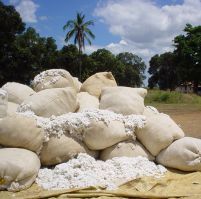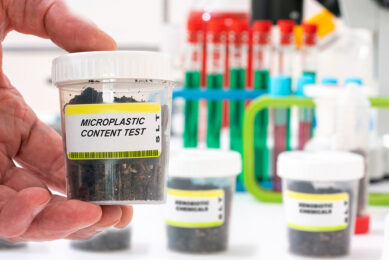CAT-scanning cotton bales for moisture

A new system for more accurately measuring moisture in cotton bales has been developed by an Agricultural Research Service (ARS) scientist.
Measuring moisture in cotton bales is important, because high moisture levels
can ruin cotton bales while they are being stored. Changes in cotton ginning
technology are creating wetter bales, with moisture distributed less uniformly
within the bales.
To deal with this problem, agricultural engineer Mathew
Pelletier at the ARS Cotton Production and Processing Unit in Lubbock, Tex. has
developed a CAT scan–three-dimensional imaging technology–to measure moisture
in cotton bales.
In recent years, there have been a growing number of
incidents in which large numbers of cotton bales–up to an entire season’s worth
from all the farmers who used a particular cotton gin–were ruined. Intensive
analysis of these bales revealed moisture levels ranging from below 7 percent to
well above 13 percent. A 7.5 percent moisture level is the maximum safe storage
level for cotton bales. It doesn’t take moisture levels much higher than that to
quickly cause color deterioration, fiber damage and mold.
Previous
microwave sensors developed by Pelletier used wide microwave beams to scan bales
for average moisture readings. The systems worked well with uniformly moist
bales. But since more and more bales now vary in moisture, equipment needs to be
capable of detecting the highest moisture point, as well as average bale
moisture.
The new prototype system developed by Pelletier sends multiple
pencil-thin microwave beams through each bale to sensors on opposite sides,
giving a 3-D image of the water distribution throughout the entire bale. It can
detect high moisture layers as well as determine overall average bale
moisture.
Read more about this research in the November-December 2008
issue of Agricultural Research magazine, available online here.
Join 26,000+ subscribers
Subscribe to our newsletter to stay updated about all the need-to-know content in the feed sector, three times a week. Beheer
Beheer









 WP Admin
WP Admin  Bewerk bericht
Bewerk bericht